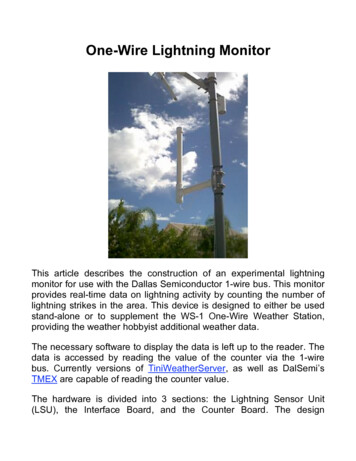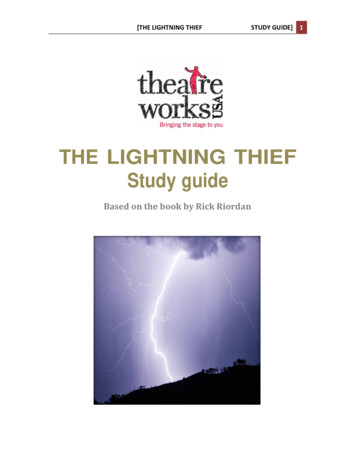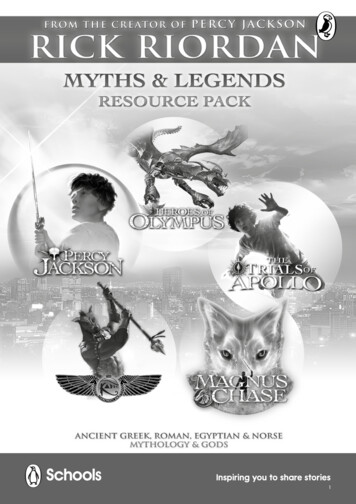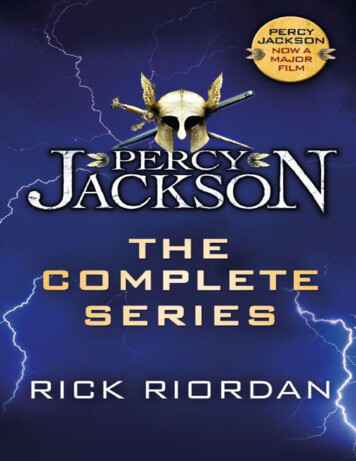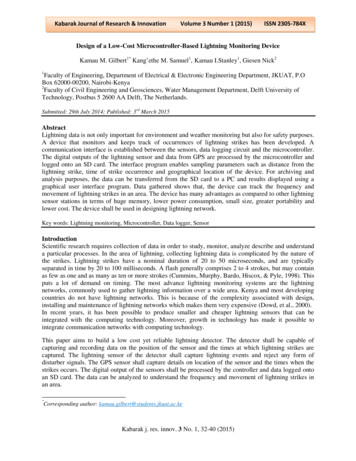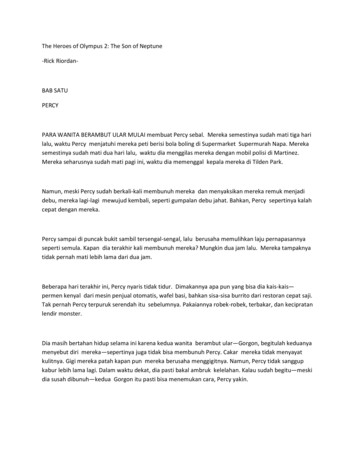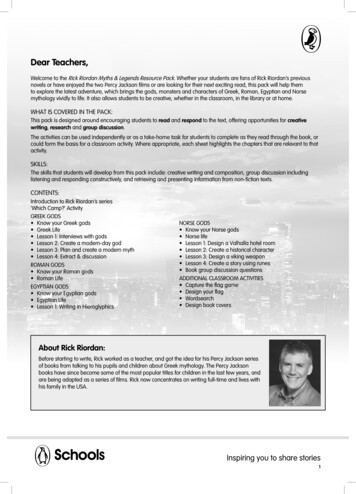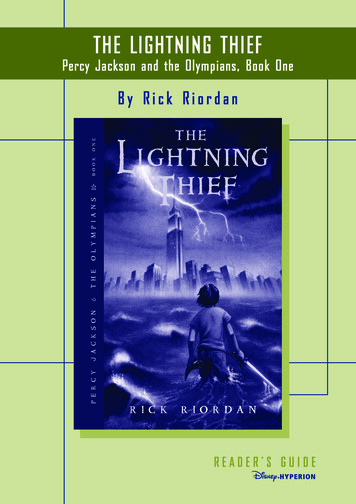
Transcription
THE LIGHTNING THIEFPercy Jackson and the Olympians, Book OneBy Rick RiordanREADER’S GUIDEd HYPERION
When 12-year-old Percy Jackson learns that his true father is Poseidon,the Greek god of the sea, he undertakes a dangerous quest across theUnited States to retrieve a stolen lightning bolt and stop a war betweenthe gods. The Lightning Thief provides a high-interest, humorousintroduction to the Greek myths. It encourages young readers toexplore elements of the classical hero’s quest rendered in a modernday setting, and to discuss such relevant issues as learning disabilities,the nature of family, and themes of loyalty, friendship and faith.
TABLE OF CONTENTSPLOT SUMMARY2GREEK MYTHOLOGY6DISCUSSION QUESTIONS12CLASSROOM ACTIVITIES16ABOUT THE AUTHOR20REFERENCE RESOURCES23
PLOT SUMMARYDuring a field trip to the Metropolitan Museum of Art, Percy Jacksonbegins to suspect that his life is not what it seems when his math teachertransforms into a Fury and attacks him. Percy manages to vaporize themonster with an ancient bronze sword, but afterwards he wonders ifthe incident was a hallucination. Everyone, including Percy’s best friendGrover, claims that the math teacher who attacked him never existed.At the end of the year, Grover insists on escorting Percy home fromboarding school. Grover’s nervousness and cryptic comments about Percybeing in danger make Percy uneasy.Percy’s home life is far from perfect. His mother Sally Jackson is a kindwoman who never had any luck in life. She dreams of being a writer, butworks at a candy shop to make ends meet and is married to “Smelly” GabeUgliano, Percy’s abusive stepfather, who expects Percy to provide him withpoker-playing money in exchange for room and board. Percy struggles tounderstand why his mother, who obviously loves him, takes such pains tosend him away every year to a different boarding school.When Percy and his mother go for a weekend retreat to the beach, theirtime together is interrupted by a storm and a horrible wailing in themiddle of the night. Percy’s friend, Grover, appears at their door andreveals himself as a satyr. He has been keeping an eye on Percy until Percyis old enough to attend Camp Half Blood, a summer camp for trainingdemigods. Grover tells Percy that monstrous forces are now after him inearnest, and they have no choice but to flee to Camp Half Blood.On the way, they are attacked by the Minotaur. Percy defeats the monster,but not before it knocks out Grover and squeezes Percy’s mother until shedisappears in a shower of gold. Heartbroken, assuming his mother is dead,Percy pulls Grover to safety over the property line of Camp Half Blood.Once at camp, Percy is reunited with his Latin teacher, who in his trueform is Chiron, the immortal centaur and trainer of heroes. Percy learnsthat the Greek gods are alive and well—an integral part of the collectiveconsciousness called Western Civilization. Olympus, the home of the2
gods, moves with the heart of the civilization, and now hovers invisiblyover the Empire State Building, since America is currently the greatpower of the West. Percy learns that the gods still have children withmortals, and that monsters naturally seek out these young demigods.Camp Half Blood serves as a safe haven where these powerful,endangered young heroes can train to defend themselves. For the pastsixty years, the “big three” (Zeus, Poseidon, and Hades) have kept anoath not to have mortal children because their powerful nature can causegreat trouble in the world, but the other Olympians still have enoughchildren to fill the camp. Percy meets Annabeth, a daughter of Athena,and Luke, a son of Hermes. He also makes a new enemy in Clarisse, adaughter of Ares. Percy’s own parentage remains undetermined untila swirling trident appears above him during a Greek-battle–style gameof capture the flag. To the astonishment of the other campers, Percyis recognized as a son of Poseidon—the first in three generations.Soon after this revelation, Percy learns that there is trouble in Olympus.Zeus’s master bolt—the weapon upon which all other lightning boltsare modeled—has been stolen, and Zeus has accused Poseidon ofinstigating the theft. The lord of the sky believes that Poseidon usedPercy, a human hero, to steal the bolt in a plot to overthrow Zeus. Zeushas given Poseidon until summer solstice—only ten days—to returnthe weapon. Poseidon is offended, but he also dreads the thought ofwar with Zeus. He needs Percy’s help to find out what really happenedto the bolt. Chiron believes that Hades, lord of the underworld, stolethe bolt to set his two brothers at each other’s throats. Chiron tellsPercy that he must travel to the entrance of the underworld in LosAngeles (by land, since Zeus would blast him out of the sky if he triedto fly), confront Hades, and return the master bolt to Olympus beforethe solstice passes in order to prevent a war between the gods.As is customary, Percy consults the Oracle before leaving. He is warnedthat he will fail to save what matters most in the end, and will bebetrayed by a friend. Deeply troubled, but believing that the quest to theunderworld is the only way to see his mother again, Percy sets out withtwo companions, Annabeth and Grover.3
PLOT SUMMARYAlong the way, the three friends learn to trust one another. Annabeth,whose mother Athena is an old rival of Poseidon, must overcome herdoubts about Percy. Grover the satyr must overcome his fear of monstersand underground places. Only by showing courage can Grover convincethe Council of Cloven Elders to grant him his life-long goal of a “searcher’slicense,” giving him the right to quest for the missing god of thewilderness, Pan. Percy comes to terms with his anger toward his father,who has suddenly declared himself after ignoring Percy for twelve years.In his travels west, Percy encounters Medusa, the Chimera, Procrustes theStretcher, and the Lotus Hotel and Casino (the Land of the Lotus Eaters).He also meets the war god Ares, who gives Percy a mysterious backpackin exchange for doing the god a favor, and a Nereid, who gives Percy threemagic pearls from Poseidon—each of which will return one person to thesea from wherever they may be, even the land of the dead.The friends finally arrive in the underworld only to discover that theyhave been tricked. The culprit is not Hades, but the defeated Titan, Kronos,who is trapped in the depths of Tartarus but is still able to manipulatethe dreams of gods and men. Hoping to start a three-way war betweenhis Olympian sons, Kronos caused the master bolt and also Hades’s helmof darkness to be stolen by a human hero whose identity Percy does notyet know. Kronos’s human thief was unexpectedly captured by Ares. Thewar god meant to keep the magic items for himself, but Kronos bent hiswill and caused the god to give the master bolt to Percy, hidden within themagic backpack, so that the young hero might bring it to the underworldfor Kronos.Hades is sure Percy is the thief who stole the bolt and his helm. The godof the dead is holding Percy’s mother—who is only frozen in a shower ofgold, not dead—and demands Percy give up the magic helm before she isreleased. As armies of the dead surround him, Percy brings out his magicpearls. With only three, he realizes he must choose between the livesof his two friends and saving his mother. In the end, he can’t abandonhis friends. Promising his mother that he will return for her, Percy andhis friends escape to the surface, where Percy battles the god Ares for4
possession of the bolt and the helm. Percy wins, gives the helm to theFuries to return to the underworld, and travels back to New York withthe bolt in time to prevent a war.At Olympus, Percy meets his father face to face. Poseidon seems distantand sad, but says he is proud of his son. He says he fears Percy has beenborn for a hero’s tragic fate. Poseidon tells Percy that his mother is back—returned as a peace offering by Hades—and that when Percy returnshome, he will have to make an important choice. Percy rushes back tohis family’s apartment, where he finds Medusa’s head waiting for him,a trophy he had forgotten mailing home earlier in his quest. He realizeshe has the chance to petrify his stepfather and save his mother from amiserable marriage. His mother implores him not to do it, however. Shemust break away from Gabe herself. Percy respects her wishes, and thusbreaks the mold of what the tragic hero might have done. The prophecythus comes true in an unexpected way: Percy fails to save what mattersmost by allowing his mother to save herself.Upon returning to Camp Half Blood, Percy is betrayed by his friend Luke,son of Hermes, who turns out to be the human hero whom Kronos used forthe theft. Luke poisons Percy, and tells him before leaving that Kronos willrise and destroy the age of the gods. Western Civilization is unraveling.Percy recovers from the poison with Chiron’s help and realizes hisadventures are not yet over. He is a hero now and must fight the rise ofthe Titans.The novel is ultimately about Percy coming of age, learning to trust hisfriends and his own abilities, accepting his parents for who they are, andchoosing love and loyalty over resentment and despair.5
GREEK MYTHOLOGYThe Lightning Thief immerses readers in the world of Greek mythology.Below are some key mythological characters referenced in the novel.The Twelve Olympian GodsZeus: Lord of the sky, chief god of the Olympians. He led the revolt againsthis father, the Titan, Kronos. His main weapon is the lightning bolt. Hissymbol is the eagle. Zeus is married to Hera but has had numerous affairswith other goddesses and mortal women. His demigod children includePerseus and Heracles (Hercules).Hera: Goddess of marriage and motherhood. The wife of Zeus and also hissister, Hera is a jealous goddess who resents her husband’s unfaithfulness.Hera helps some heroes, like Jason, but was the enemy to others, namelyHeracles (Hercules). Her symbols are the cow (the most motherly animal)and the colorful peacock.Poseidon: God of the sea, Zeus’s brother. Poseidon is a changeable god, likethe ocean itself, sometimes violent, sometimes calm. He created horses fromsea foam and like his brother Zeus has had many affairs with goddessesand mortal women. Theseus was his most famous demigod son. Poseidon’ssymbol is the trident, which he uses to stir up terrible storms at sea.Demeter: Goddess of agriculture, sister of Hera and Zeus. The mostfamous story about Demeter tells how her daughter Persephone wascaptured by Hades and taken to the underworld. Demeter and Hadesfinally worked out an agreement by which Persephone would spend halfthe year with her mother and half the year with her new husband Hades.Demeter would only allow crops to grow during the time Persephone waswith her. Thus the seasons were created.Ares: God of war, Ares is the proud and cruel son of Zeus and Hera. Heloves battle, but despite his strength he is not a smart tactician. At heart, heis a coward, like most bullies. His symbol is the wild boar and his favoriteweapon is the spear. He is Aphrodite’s lover.6
Athena: Goddess of war, wisdom, and useful crafts. The patron goddess ofAthens, from whom the city got its name. Athena sprang from Zeus’s head,which Hephaestus had to split open to relieve the god’s headache. Athenainvented many things, including the chariot and the loom. She grantedmankind the olive tree. One of the most popular goddesses, she oftenhelps heroes who use their brains, like Odysseus. She dislikes Poseidonand Ares. Her symbols are the owl, the olive tree, and the aegis, a specialshield upon which is mounted the head of Medusa.Apollo: God of archery, divination, and the arts. Later, Apollo was alsoassociated with the sun. Handsome and talented, Apollo is the twin brotherof Artemis. He is the patron of archers, and created music. He slew thegreat Python, and became the force behind the Oracle at Delphi, whichcould tell the future. There were other oracles, but the one at Delphi was themost famous. The Oracle often spoke in riddles which were not clear untilafter events came to pass. Apollo’s symbols are the lyre, the laurel tree, andthe mouse (an animal which ran everywhere and overheard many secrets).Artemis: Goddess of the hunt and the moon. Artemis vowed to always be amaiden. Because of this, her followers tended to be young unmarried girlswho shunned men. A great archer and hunter, Artemis roams the wilds ofthe world with a band of maidens. Her symbols are the deer and the bow.Hephaestus: God of fire and blacksmithing. As a baby, Hephaestus wasthrown from Olympus by his father Zeus. Because of this, he grew upugly and crippled, but was extremely good at working with his hands.He can make anything out of metal. He was given Aphrodite as his bride,because Hera thought it would help Aphrodite settle down. Unfortunately,Aphrodite has affairs behind her husband’s back, and Hephaestus isalways trying to catch his wife with her lovers.Aphrodite: The goddess of love, who was born from sea foam. She is themost beautiful goddess, and very vain. She has a magic girdle (belt) whichcan cause anyone to fall in love with her. Though married to Hephaestus,her main boyfriend is Ares. Her symbol is the dove.7
GREEK MYTHOLOGYHermes: The god of merchants, travelers, thieves, and medicine. Hermeswatches over all who use the roads and are involved in commerce. Theson of Zeus, Hermes could talk when he was only a baby and once stolecattle from Apollo. He made up for this by giving Apollo the lyre, whichbaby Hermes invented. Hermes uses his speedy winged sandals to delivermessages for the gods. He carries a caduceus, a winged staff entwinedwith serpents, which today is the symbol of medicine.Dionysus: The god of wine. Dionysus was born a mortal, but Zeus grantedhim immortality when he invented wine. Dionysus once led a drunkenarmy to India, where he captured some tigers. He once turned a boatloadof sailors into dolphins because they would not honor him. Dionysus wasalso the god who gave Midas his golden touch.Other gods and Titans:Hades: The god of the underworld. Not technically an Olympian since hehas no throne on Olympus, Zeus’s brother Hades was made lord of theunderworld when the gods took over the world. He oversees the soulsof the dead and all the riches under the earth. He also guards the pit ofTartarus, where the Titans and monsters were imprisoned after the greatwar. His servants include the three Furies, Charon the ferryman of thedead, and the three-headed dog Cerberus.Kronos: The lord of the Titans, Kronos ruled before the gods. He is calledthe Twisted One, and took over the world when he sliced his own fatherOuranus to pieces with a scythe. He feared his own children, the gods,would do the same to him, so ate them all as soon as they were born, buthis wife, Rhea, hid their sixth child, Zeus, and gave Kronos a rock to eatinstead. When Zeus was older, he tricked his father into disgorging hisother children. The gods united and waged a terrible war against Kronos.Eventually, Kronos was cast into Tartarus.Rhea: The wife of Kronos, mother of the six first gods: Zeus, Poseidon,Hades, Hera, Demeter, and Hestia.8
Hestia: The goddess of hearth and home. A gentle, humble goddess, Hestiagave up her seat on the Olympian council to Dionysus in order to keeppeace among the gods. Afterwards, she tended the hearth in the middle ofthe throne room. She is the goddess of domestic harmony.Prometheus: A Titan who did not fight against the gods, Prometheuswas one of the first to see the potential of men. Against Zeus’s order,Prometheus brought man the secret of fire and allowed human civilizationto begin. As a punishment, Zeus had Prometheus chained to a rock, wherebirds of prey would devour his liver each day. Some say he was finallyfreed from his torment by Heracles (Hercules).Monsters and strange creatures:Furies: The three Furies were avenging spirits controlled by Hades. Theyhad bat wings, fiery whips, and are sometimes pictured with bleedingeyes, snake hair, and the heads of dogs. They oversaw some of thepunishment in the underworld, but Hades would also send them into theworld of the living to punish especially wicked people. They could drivetheir victims mad.Fates: The three Fates were mysterious old hags who controlled the destinyof all living beings from birth to death. They spun out each life as a thread,and cut it at the moment of death. Even the supposedly immortal godswere afraid of the Fates.Harpies: Harpies are wild, unruly bird-winged maidens, sometimespictured as ugly hags. They stole food from the seer Phineas as apunishment from Zeus. Sometimes they carried off people to theunderworld.Cerberus: The three-headed dog who guards the gates of the underworld.A son of the monster Echidna, Cerberus permits new spirits to enter theworld of the dead, but will not allow any to leave.9
GREEK MYTHOLOGYCharon: The ferryman of the dead. Greeks would leave a coin under thetongue of a dead person to pay for passage across the River Styx. Thosewho could not pay were doomed to wander the earth until they foundsome other way into the underworld.Chiron: This immortal centaur was kindly and wise. He trained manyheroes, including Heracles (Hercules).Satyrs: These creatures are human from the waist up, goat from the waistdown. They inhabit the wild places of the earth, and are the companions ofthe wine god Dionysus.Centaurs: Centaurs are human from the waist up, horse from the waistdown. Most are wild barbaric creatures, though one, the famous teacherChiron, is immortal and quite wise.Medusa: One of three sisters called the Gorgons, Medusa was once a lovelymaiden. She had an affair with Poseidon in the temple of Athena, andbecause of this Athena turned her into a hideous monster. Her hair becamelive snakes, and her gaze could petrify any who looked upon her. Perseuslater cut off her head, which was mounted on Athena’s shield, the aegis.Minotaur: The horrible son of Pasiphae, the queen of Crete, who matedwith a white bull because of a curse inflicted by Poseidon. The Minotaurwas half-man, half-bull. He caused so much destruction that King Minoshad his famous architect Daedalus build a maze called the Labyrinth toimprison the beast. Each year, maidens and young men from Athens weresacrificed to the Minotaur until Theseus killed the monster.Naiads: Female spirits that inhabit bodies of fresh water such as riversand lakes.Nereids: Female spirits of the sea.10
Dryads: Female spirits of nature that live in trees or forests.Procrustes: “The Stretcher.” This giant challenged Theseus on his wayto Athens. He made each guest lie on a bed. If the guest was too short,Procrustes would stretch him to fit. If the guest was too long, Procrusteswould cut off whatever hung off the bed.Echidna: The mate of the horrible monster Typhon, Echidna was halfwoman, half-serpent. She had many monstrous children, which Zeusallowed to live as a challenge to future heroes. Her offspring includedCerberus, the Nemean Lion, and the Chimera.Chimera: The Chimera was one monstrous offspring of Echidna. It hadthe body of a goat, the head of a lion, and the tail of a serpent. It terrorizedAsia Minor until it was killed by the hero Bellerophon.Lotus Eaters: On his way back from the Trojan War, Odysseusencountered the Land of the Lotus Eaters, where the inhabitants lived inperfect contentment doing nothing but eating lotuses all day. This lazylifestyle was dangerous because it tempted Odysseus’s sailors to forgetabout their journey and remain on the island.11
DISCUSSION QUESTIONS1. P ercy has been diagnosed with ADHD (attention deficit hyperactivitydisorder). The main traits of ADHD are inattention, hyperactivity, andimpulsivity. The ADHD child often has trouble keeping his mind onone thing and organizing a task. He feels restless and fidgety. He mayblurt out comments or act without thinking. Does this profile fit Percy?Discuss how Percy does/does not seem like an ADHD child.2. Percy says, “Mr. Brunner expected me to be as good as everybodyelse, despite the fact I had dyslexia and I had never made above a C- inmy life. No—he didn’t expect me to be as good. He expected me to bebetter.” What do you think of Mr. Brunner as a teacher?3. When describing his mother, Percy says, “She’s the best person inthe world, which just proves my theory that the best people get therottenest luck.” How does this apply to Percy’s mom? Is this theory truein life? In the Greek myths?4. Percy gets exasperated with his mother because she puts up withSmelly Gabe, yet he is proud of her because “she did have a rebelliousstreak, like me.” Do you find Sally Jackson a strong character? Does shestand up for herself? For her son?5. ercy’s first encounter with an Olympian god is Mr. D, Dionysus.PInitially, Percy has a hard time believing Mr. D is immortal. What isyour reaction to the way Dionysus is portrayed in the book? The Greekgods have very human traits—would this make them easier or harderto believe in?6. Chiron describes Western Civilization as “a living force. A collectiveconsciousness that has burned bright for thousands of years.” He saysthe Greek gods are part of this, and move around as different nationsbecome the central power of Western Civilization—Greece, Rome,Germany, France, England, the United States. What do you think ofthis idea? Is “the West” a clearly identifiable cultural force?12
7. Annabeth is the daughter of Athena, the goddess of wisdom andwarfare. Read the description of Athena in this guide. Look at someof the myths about Athena, including the stories of Arachne, Medusa,and the founding of Athens. How is Annabeth like her mother? Doesanything about Annabeth’s character strike you as unlike Athena?8. After Percy learns he is a half-blood, he wonders who his own father is.He also learns that some half-bloods never find out. He says, “I thoughtabout some of the kids I’d seen in the Hermes cabin—teenagers wholooked sullen and depressed, like they were waiting for a call thatwould never come. I’d known kids like that at Yancy Academy, shuffledoff to boarding school by rich parents who didn’t have the time to dealwith them. But gods should behave better.” How would you feel if youwere in Percy’s place? Would it be easier to believe your father wasdead, or to know that he was alive but not communicating with you?9. hen Percy finally learns the truth that he is the son of Poseidon, areWyou surprised? What hints are dropped before the revelation? Howdoes Percy’s personality fit/not fit the god Poseidon?10. Throughout the book, humor is used to counterbalance the serioussituations Percy faces. For instance, the Minotaur wears white Fruit-ofthe-Loom underwear, and Percy wants to tell the mummified Oracle,“thanks, wrong door, just looking for the bathroom.” What’s yourreaction to the book’s humor? Does it seem appropriate for a sixthgrade narrator? Does it change your perception of the mythology?11. When describing the effects of Mist, Chiron says, “Remarkable, really,the lengths humans will go to fit things into their version of reality.”How is this true in the novel? In Greek mythology? In real life?12. Medusa tempts Percy to stay with her as a statue. She warns him thathe is simply a pawn of the gods. Does Percy seem like a pawn? Whyor why not? If you were given Percy’s quest, would you undertake itor would you rebel?13
DISCUSSION QUESTIONS13. Read Grover’s account of the search for Pan in Chapter 12. Percywonders if this is a hopeless quest, trying to reclaim the spirit ofthe wilderness. Do you think the search for Pan is an appropriatemetaphor for modern man’s relationship with nature? Is “the wild”being lost forever?14. Dreams play an important role in the narrative. At Montauk, Percyfirst dreams of a horse and eagle fighting on the beach. Later, hedreams of a voice from the pit. As he gets closer to Los Angeles, hisdreams get scarier and more specific. What would the book be likewithout these dream episodes? Is there information that Percy canonly get from his dreams?15. P ercy’s fight with Echidna and the Chimera is a low point for hismorale. He begins to doubt that he is capable of being a hero. Whydoes he feel this way, and do you think his doubts are reasonable?What does this fight scene reveal about Percy’s character?16. The god, Ares, says he loves America. He calls it “the best place sinceSparta.” What does he mean? Do you think this is a fair critique ofAmerican society? Why or why not?17. The Lotus Casino in Las Vegas is a modern-day version of the Landof the Lotus Eaters, which Odysseus visited on his way back fromTroy. Read the original version from The Odyssey. How do the twoaccounts differ? Is the danger Odysseus faced similar to the dangerfaced by Percy and his friends? Is society today more dominated by“Lotus Eaters”?18. As the book progresses, we learn more about Annabeth’s family life,and her unhappy history with her father. How does this compare withPercy’s own family? How does this help the two half-bloods overcometheir mutual distrust?14
19. Read the modernized description of the underworld in Ch. 18—the EZ Death line, the security ghouls, the pollution in the RiverStyx. What do you think of this portrayal of the afterlife? Percy saysAsphodel makes him depressed because “so few people did good intheir lives.” Do you think believing in paradise and punishment makespeople more likely to do good deeds? What do you think of the Greekconcept of Asphodel, a neutral area where most of the dead are sent todo nothing for eternity?20. Percy’s trip to the underworld does not turn out as he suspected.What do you think of Percy’s decision to leave his mother behind?What does the scene in the throne room tell you about the threefriends—Annabeth, Grover, and Percy?21. W hen Percy finally meets his father, Poseidon seems distant and hardto read. Percy says that he is actually glad about this. “If he’d triedto apologize, or told me he loved me, or even smiled—that would’vefelt fake. Like a human dad, making some lame excuse for not beingaround.” Do you agree with Percy? Do you find yourself likingPoseidon or not?22. How does the last line of the prophecy—you shall fail to save whatmatters most in the end—come true? What do you think of this ending?Did Percy make the right choice? What would you have done in hisplace?23. In the end of the book, do you sympathize at all with Luke’s feelingsof betrayal? How does his story act as a foil (a counterpoint) toPercy’s own?15
CLASSROOM ACTIVITIES1.T he Gods of Olympus. Before reading the book, have students fill outthe attached worksheet, “The Gods of Olympus,” to see how muchthey know about Greek mythology. Once they’ve filled out as much asthey know on their own, have them work with a partner to comparenotes. This works well as a timed activity. Make it a competition to seewho can get the most, with their partner, in 2–5 minutes. Stress that itis okay to be wrong on this activity—they are simply trying to jog theirmemory as much as possible.2. Pick an Immortal Parent. Remind students that the gods frequentlyhad children with mortals. Ask them to research which god or goddessthey would most like to be related to. For ideas, visit the web sitehttp://www.theoi.com. Students should write down their top threechoices and explain each.3. The Battle with the Titans. Read an account of the Titanomachy,the war between the gods and Titans. One is available online at:http://en.wikipedia.org/wiki/Titanomachy. Compare this to theversion Percy gives Mr. Brunner in Ch. 1. Make a list of any differencesbetween the two versions. Make a list of details Percy forgot to include.16
4. Make a Graphic. A graphic is an illustrated representation of onechapter. You can do this on regular printer paper, or larger art paper. Itcan be done individually or with a partner. A graphic has the followingcomponents:a. A picture in the middle which is a symbol for the chapter. It can bean important object mentioned in the chapter—the bus, for instance,or a pair of scissors.b. At least three colors used to color the object. Each color has torepresent something, and you must write why you chose that color.For instance, “Red stands for Percy’s anger at being expelled.”c. On each corner of the page, pick a quote from the chapter and copyit. The quote can be any 1–2 line section that you think is significant,important, or tells something revealing about one of the characters.After each quote, explain what it means and why you picked it in asentence.d. Put the title of the chapter and your name at the top. Once students learn how to do a graphic format, it can be easily usedwith any chapter or short story in the future. A sample graphic is attached.5. Character Collage. This activity can either be done with computersand Internet clipart, or paper and old magazines. Ask students to makea list of characters they’ve met in the book so far. These include: Percy,Grover, Nancy Bobofit, Mrs. Dodds, Mr. Brunner, Smelly Gabe, andSally Jackson. Have them search and cut out (or copy on a computer)photos of people that they think are close to how these characterswould appear. Paste these onto a large piece of paper (or intoPowerPoint or a similar computer program). Students should then labeleach character and find a quote about them from the book—either adescription of the character or something they said. This line should bewritten underneath each character’s picture. This activity is good forkeeping the characters straight and can be a lot of fun when studentsstart comparing their visualizations of the different characters.Working in pairs is good for this activity.17
CLASSROOM ACTIVITIESGods of OlympusIn each throne, write anything you think is true about that god or tiaArtemisHephaestusAphroditeHermesDionysus18
A Sample Graphic(this is for chapt
The Lightning Thief immerses readers in the world of Greek mythology. Below are some key mythological characters referenced in the novel. The Twelve Olympian Gods Zeus: Lord of the sky, chief god of the Olympians. He led the revolt against his father, the Titan, Kronos. His ma

